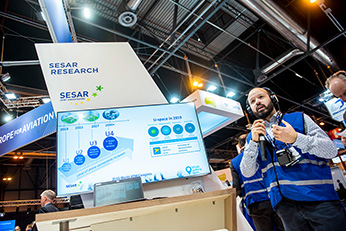In short
|
PROJECT ID
|
USIS |
|---|---|
|
PROJECT DURATION
|
2018-01-01 > 2019-11-30 |
|
PROJECT TYPE
|
Large scale demonstrations |
|
TOTAL COST
|
1 799 323,75 |
|
EU CONTR.
|
1 308 671,13 |
|
STATUS
|
R&D completed |
Ensuring U-space services are safe and secure
U-space relies on a higher level of automation than ATM. Many services are currently being developed and need to be validated and regulated to ensure safe and secure operations. USIS research sought to validate the services that will be provided by U-space service providers to drone operators and third parties, including the authorities in charge of the airspace, to demonstrate their readiness at a European level.
The USIS project considered initial U-space services of e-registration and e-identification, as well as more advanced flight planning, authorisation and tracking services necessary for beyond visual line of sight and operations over people. It also looked at scheduling and dynamic airspace management.
USIS partners carried out live demonstrations using a secure and resilient cloud-based platform at locations in France and Hungary. A dedicated application allowed drone operators to submit flight requests which were then analysed and approved or declined by the appropriate authority. An embedded hardware connected to the mobile phone network was used to securely identify and track the equipped drones.
In France, the trial focused on current use cases. For example, drone operators in Lille region participated while conducting regular operations such as aerial videos in rural and sub-urban environments. A few dedicated flights were also organized around Lille airport. In Hungary, the trial focuses on future use cases. Dedicated flights were carried out in a rural environment, exploring search and rescue, parcel delivery, agricultural surveying and surveillance scenarios.
The research validated the use by a platform of a national registry (using the example of the French AlphaTango service); and confirmed the technical feasibility of secured identification and tracking of drones through an embedded hardware connected to mobile phone networks. This was used to monitor the compliance between the position of the drones and the approved operations.
The project showed that initial U-space services can support multiple numbers of drone operations without creating additional workload for an operator or impacting the safety of the airspace. It highlighted the need for flexibility when carrying out flight planning and approval management processes to cope with different national and local regulations.
Further examples by active drone operators will contribute to future research and development.
This project has received funding from the SESAR Joint Undertaking under the European Union's Horizon 2020 research and innovation programme under grant agreement No 783261




